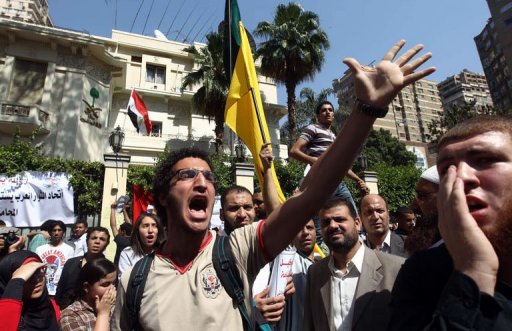By Agencies
CAIRO: Egyptian Prime Minister Ahmed Shafiq resigned unexpectedly Thursday, sparking celebrations from protesters who demand a purge of the remnants of ousted president Hosni Mubarak’s regime.
The country’s military rulers said he would be replaced by Essam Sharaf, a former transport minister who joined the rallies in Cairo’s Tahrir Square that led to Mubarak’s resignation on Feb. 11.
Strongman Mubarak appointed Shafiq in the dying days of his rule in a bid to quell the protests. Shafiq stayed on as head of a caretaker government under a military council that has run Egypt since Mubarak stood down.
“The Supreme Council of Military Forces announces that it has accepted the resignation of Prime Minister Ahmed Shafiq,” the council said in a statement, without giving reasons for the move.
Dozens of youth activists who are still camped out in Tahrir Square celebrated after Shafiq’s resignation was announced.
Since the fall of Mubarak, protesters have continued to call for a replacement of the current government, which includes the Mubarak-era foreign minister, interior minister and justice minister.
They had put forward Sharaf’s name during talks with the military on Sunday during which they also called for rapid, profound changes towards democracy.
“We are happy, we had proposed his name and our demand has been accepted,” Shadi Al-Ghazali Harb, one of the leaders of the youth movement, told AFP.
The prompt acceptance by the military of Shafiq’s resignation shows the sensitivity of the ruling generals to the demands of the uprising’s leaders, but many in Egypt now believe the military should put its foot down and focus on restoring law and order in this country of 80 million people.
Egypt has been gripped by a crime wave it had not seen in living memory, with a marked rise in armed robberies, arson and street battles between rival criminal gangs over territory. Demoralized and hated by many for their perceived brutality against protesters, security forces have yet to fully take back the streets. They numbered around 500,000 on the eve of the protests.
The military police, meanwhile, has stepped in to fill the vacuum, but its personnel don’t have the intelligence capabilities or the manpower to efficiently police the country.
Beside security, one of the main tasks now facing Sharaf is to revive the economy hard hit by the protests. The stock market has been closed for more than a month and foreign tourists have only begun to trickle back in small numbers. Investor confidence has been badly hit too by the dozens of criminal investigations into corruption allegations against senior officials from the former regime.
One Shafiq aide said appointing Sharaf was timed to defuse calls for another mass rally by protesters on Friday after a first modest reshuffle by Shafiq failed to mollify protesters who want a clean break with the Mubarak era.
“This is a shocking and premature resignation. There have been pressures from the streets that he quit,” one of Shafiq’s aides told Reuters, asking not to be identified.
“There was fear of Friday’s protests and how big they may be. He actually wanted to leave before this week as well and does not want to agitate the people,” the aide said.
Key opposition figure Mohamed ElBaradei, who headed the Vienna-based UN International Atomic Energy Agency from 1997 to 2009 and returned to Egypt join the protests, welcomed Shafiq’s resignation.
On Twitter, he said: “We are on the right track, I express my sincere appreciation to the Supreme Council of Armed Forces who have accepted the demand of the people.”
The military council had previously ordered the government to run the country’s affairs for six months “or until the end of parliamentary and presidential elections” and is also examining constitutional reforms.
Shafiq, a former aviation minister with ties to the military, had been expected to stay in office at least until the elections.
His successor, Sharaf, a professor of engineering at Cairo University, was transport minister from 2004 to 2005 when he resigned amid differences with then-premier Ahmad Nazif.
Nazif was himself sacked four days after the anti-Mubarak protests erupted on January 25.
Sharaf had returned to academia to teach as a professor at Cairo University. He received a doctorate from America’s Purdue University in 1984.
The Muslim Brotherhood and other political groupings had also been calling for Shafiq and his government, where the key defense, justice, foreign and interior ministers were all appointed during the Mubarak era, to step aside.
They had demanded a new line of technocrats as ministers after 30 years of Mubarak’s rule. The cabinet will act as an interim government while Egypt holds a referendum on constitutional amendments in March, a parliamentary vote in June and a presidential election about six weeks after that.
The state news agency MENA said Egypt’s military council had met a group including ElBaradei and Arab League chief Amr Moussa on Tuesday to discuss upcoming reforms.
The talks focused on constitutional reform, especially on the conditions for presidential candidates and the reduction of the number of terms allowed to a maximum two of four years, instead of an unlimited number of six-year terms, it said.
Moussa said last month he would be a candidate for Egyptian president.


